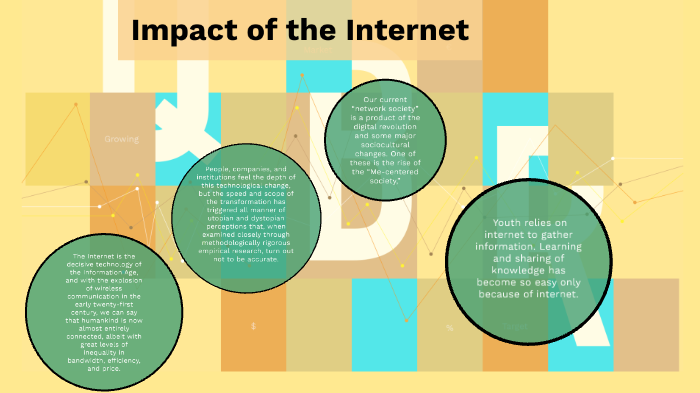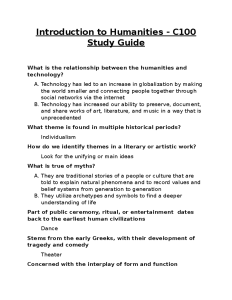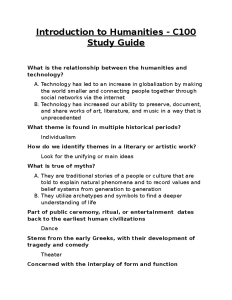The impact of the internet on fiction has transformed the literary landscape, influencing how stories are created, shared, and consumed. In this digital age, writers are navigating a world where traditional barriers to publication have been lowered, allowing a proliferation of voices and perspectives that were previously marginalized. However, this democratization comes with challenges, as social media has turned readers into public audiences, reshaping their experiences and expectations. As literature adapts to the pressures of instant feedback and viral trends, questions arise about the integrity and depth of storytelling in contemporary settings. While the internet enhances access to information and connectivity, it also risks diluting the intimate artistry that has characterized fiction throughout history.
Exploring the effects of online platforms on literary creation reveals a significant shift in the dynamics of storytelling. Nowadays, we refer to this phenomenon as the digital transformation of literature, where the proliferation of social media and instant messaging heavily influences narrative styles and reader engagement. Writers find themselves adapting their craft to meet the tastes shaped by online influencers, leading to both opportunities and challenges in fiction writing in the internet era. Furthermore, the expectations of modern audiences have evolved as readers become more involved in shaping literary discussions and trends. This evolving landscape raises important questions about the authenticity and emotional resonance of contemporary narratives.
How the Internet Changed Literature
The internet has transformed the landscape of literature in ways that were previously unimaginable. Writers today have access to a vast array of resources at their fingertips, allowing for unprecedented levels of research that enhance their storytelling. This ease of access means that authors can incorporate immense detail into their narratives, enriching their fiction with factual accuracy that adds depth to their characters and plots. However, this shift also leads to a paradox where the quality of engagement may dwindle as the sheer volume of available information can overwhelm readers and writers alike.
Moreover, the internet’s impact on narrative structure and content cannot be overlooked. Writers are now more influenced by trends dictated by online communities and social media platforms, which can lead to homogenization in storytelling. While the convenience of online platforms fosters creativity through collaboration and feedback, it also pressures writers to conform to popular tastes, potentially stifling originality in their work. As a result, the evolution of fiction in this digital age presents both opportunities and challenges that continue to shape the trajectory of literature.
The Modern Reader: Audiences vs. Readers
In the era of social media, the dynamics between readers and writers have shifted significantly, with readers now often considered as audiences. This transformation is evidenced by the tendency of readers to engage more with works that are popularized through likes and shares, rather than seeking out traditional literary critique. The implications of this shift can be profound; authors might prioritize the immediate gratification of mass appeal over the exploration of challenging themes that provoke thought and introspection. This alteration in audience perception is crucial as it shapes the types of stories that are told.
Moreover, the presence of influencers can skew tastes and create echo chambers where certain genres or themes dominate the conversation. Writers may feel compelled to tailor their narratives to fit within these confines, risking the authenticity of their voice. In contrast, the conventional reader-author relationship centered on intimate exploration of personal truths is sometimes lost in the clamor for virality. The challenge lies in balancing the demands of an audience while remaining true to the art of storytelling, encouraging a return to the deep, reflective nature that fiction has always offered.
Digital Age Fiction: Benefits and Drawbacks
The advent of the digital age has unlocked new pathways for fiction to thrive, providing unprecedented accessibility to literature through ebooks and online platforms. Readers can discover diverse voices and stories from around the globe with just a click, which was unimaginable in the past. This increased access has democratized literature, allowing lesser-known authors to reach audiences they may never have encountered through traditional publishing routes. In this sense, the internet has revolutionized how we engage with stories and has expanded the breadth of narratives available to readers.
However, this ease of access comes at a cost; the tendency to consume content quickly can undermine deep reading practices. The distractions of social media and other online activities often pull readers away from engaging deeply with texts, affecting their understanding and appreciation of complex narratives. Additionally, the pressure to produce content rapidly can lead authors to prioritize quantity over quality, which may dilute the richness of fiction. Balancing the advantages of instant access with the need for thoughtful reading and writing practices remains a critical challenge for both readers and writers.
Fiction Writing in the Internet Era
In today’s internet-driven world, writers navigate a landscape rife with opportunities and challenges. The mechanisms of storytelling are evolving, as authors now incorporate multimedia elements into their narratives, creating immersive experiences that blend text with video, audio, and social interactions. This integration can enrich the storytelling process, allowing readers to engage with narratives in novel ways. However, it also demands a new set of skills from writers, who must adapt their traditional storytelling techniques to fit the evolving formats and platforms.
Even as writers embrace these new formats, the essence of fiction remains unchanged — the exploration of the human experience. Yet, the immediacy of feedback from online audiences can pressure authors to conform to popular expectations, impacting the authenticity of their work. Finding a balance between innovation and maintaining a unique narrative voice is essential for authors navigating fiction writing in the internet era. The challenge lies in harnessing the potential of digital storytelling while preserving the soul of fiction.
Social Media’s Influence on Reading Habits
Social media has profoundly influenced reading habits, transforming how people discover and discuss literature. Platforms like Instagram, Twitter, and TikTok have given rise to the phenomenon of book influencers, who curate and promote titles to their followers, often leading to viral trends. This new form of engagement can stimulate interest in books that might otherwise go unnoticed, helping create a vibrant literary community. However, the downside is that many readers may gravitate toward popular titles instead of exploring diverse genres or authors, limiting their literary horizons.
Additionally, the rapid pace of social media may diminish the depth of reader engagement. With constant notifications and updates vying for attention, taking time to read deeply can be challenging. The communal aspect of sharing reading experiences online can be enriching, providing platforms for discussion and connection among readers. Yet, it also encourages a culture of superficial consumption, where readers quickly move on to the next trending book rather than fully immersing themselves in a single narrative. Embracing the positives while mitigating the negatives of social media’s impact on reading is crucial for fostering a rich literary culture.
The Loss of Traditional Narrative Devices
As the internet weaves itself into the fabric of our lives, certain traditional narrative devices have become obsolete. A prime example is the plot device of characters losing each other or being unable to communicate — scenarios that are drastically less likely in our hyper-connected world. In contemporary storytelling, the omnipresence of digital communication tools often diminishes the dramatic tension associated with separation or misunderstanding. This evolution raises questions about how modern storytelling can adapt to provide complex emotional arcs without relying on the isolation that once made for compelling narratives.
Despite these changes, the essence of storytelling — the exploration of human relationships, challenges, and growth — remains vital. Writers must find new ways to create tension and intrigue in their narratives that resonate with readers immersed in a world where connectivity is the norm. By leveraging alternative narrative structures and themes that reflect the realities of modern life, authors can still capture the intricacies of human experience, even in an internet-saturated landscape.
Research in the Digital Realm
The internet serves as an invaluable tool for research, allowing writers to delve into historical contexts, gather data, and uncover details that enhance their storytelling. Online databases and archives provide instant access to resources that were once limited to physical libraries, making it easier for authors to ground their narratives in factual accuracy. This accessibility empowers writers to create richer worlds and more authentic characters, reflecting contemporary realities that resonate with their audience.
However, the ease of online research may inadvertently encourage a lack of thoroughness or depth, as the temptation to gather information quickly can result in superficial understanding. Writers might overlook the importance of engaging deeply with their sources and relying solely on digital content, potentially missing nuances that come from comprehensive study. Thus, while the internet significantly aids the research process, it is crucial for authors to balance online resources with traditional methodologies to achieve a comprehensive understanding of their subjects.
Shaping Emotional Truth in Fiction
Emotional truth remains a pillar of fiction, serving as the bridge between readers and the narrative’s emotional landscape. In an age dominated by rapid communication and curated personas on social media, capturing the authentic emotional experience becomes increasingly challenging. The internet allows for an abundance of voices and stories, yet it can also dilute the raw emotional power that comes from deeply personal narratives. Writers must strive to retain the essence of emotional truth while navigating the distractions of the digital world.
Fiction offers a unique lens through which readers can explore complex feelings and experiences that aren’t confined by factual accuracy. In an era where information overload can lead to desensitization, compelling fiction has the power to evoke empathy and provoke thought in ways that other media may not. By prioritizing emotional depth and crafting narratives that resonate with shared human experiences, writers can create a lasting impact that transcends the ephemeral nature of online content.
The Future of Fiction in the Digital Age
As we look towards the future of fiction in the digital age, the interplay between technology and literature will continue to evolve. Authors are increasingly exploring innovative storytelling methods, such as interactive narratives and multimedia storytelling that incorporate audio, video, and visual art. This trend reflects a growing desire to engage audiences in more immersive ways, allowing for a richer and more dynamic reading experience. At the same time, the core principles of storytelling remain unchanged — writers must still connect with their readers through universal themes and complex characters.
However, the potential for technology to overshadow traditional storytelling practices poses a critical challenge. As readers become accustomed to bite-sized content and instant gratification, the task of cultivating patience for deeper reading will be essential for both writers and audiences. The future landscape of fiction will likely require a thoughtful balance of innovation and reverence for storytelling traditions, as authors find ways to honor the craft while embracing the opportunities presented by the digital age.
Frequently Asked Questions
How has the internet changed literature and fiction writing?
The internet has drastically changed literature by altering how fiction is written, shared, and consumed. Writers now navigate a landscape influenced by social media, where audience feedback can shape narratives. The convenience of online research allows for more intricate storytelling, while at the same time, the overwhelming volume of online content competes for readers’ attention, potentially diminishing the depth of engagement with fiction.
What impact does social media have on reading habits and fiction?
Social media impacts reading habits significantly by transforming readers into audiences, where popular opinion sways literary taste. This dynamic can pressure writers to conform to mass preferences rather than pursue challenging, subversive narratives. While social media facilitates book recommendations and community engagement, it also poses a distraction that can lead to decreased reading time and depth.
In what ways has digital age fiction evolved due to the internet?
Digital age fiction has evolved to include diverse formats, such as blogs, eBooks, and interactive storytelling. Authors can reach their audiences directly online, experiment with short-form narratives, and engage with readers through social media. However, these changes also raise questions about the quality of content and the authenticity of the storytelling process in an age dominated by instant gratification.
How does writing fiction in the internet era differ from traditional methods?
Writing fiction in the internet era often involves faster research, broader accessibility to resources, and immediate feedback from readers. Authors now have tools to connect with their audience in real time; however, this can create pressure that affects artistic integrity. The presence of online platforms may lead to trend-chasing, rather than cultivating unique voices and challenging themes.
What modern influences shape contemporary fiction in the internet age?
Contemporary fiction is shaped by various modern influences, including the speed of information exchange, the prevalence of social media, and the accessibility of content across digital platforms. These elements can enhance the storytelling process by providing immediate resources and audience reach but also challenge authors to maintain their creative authenticity amid public scrutiny and the demands of mass consumption.
What are the positive aspects of the internet on fiction writing?
The internet offers significant benefits for fiction writing, including easy access to extensive research material, online writing tools, and platforms for sharing work. Writers can quickly engage and build a community with readers, boosting visibility for new works. The rise of eBooks and digital distribution has also democratized access to literature, allowing more voices to be heard.
How has the timeliness of stories in fiction changed with the internet?
The internet has shortened the creative cycle of fiction writing, making timely and topical stories more relevant. Authors can rapidly respond to current events and cultural trends, integrating them into their narratives. However, this urgency can sometimes lead to less comprehensive storytelling as the pressure to remain relevant increases.
Does the internet diminish the emotional depth of fiction?
There is concern that the internet may dilute the emotional depth of fiction, as authors may feel compelled to cater to popular trends or immediate audience feedback. This shift could hinder the exploration of deeper emotional truths that are often central to compelling storytelling. However, many writers still strive to blend relevance with profound emotional narratives, showcasing the enduring power of fiction.
What challenges do authors face in capturing attention in the internet era?
Authors face the challenge of a saturated market where countless voices compete for attention. The prevalence of quick, easily digestible content can lead to shorter attention spans among readers, making it difficult for more nuanced, traditional fiction to find its audience. Additionally, the pressure from social media metrics can shape creative decisions, affecting the authenticity of the work.
| Key Point | Author | Summary |
|---|---|---|
| Readers have become audiences | Greg Jackson | The internet has transformed readers into audiences, leading to public judgment that influences writing and diminishes private truth in fiction. |
| A time-saver and a time-suck | Scott Turow | While the internet aids in research and enhances storytelling, it also competes for readers’ time, leading to decreased book sales. |
| We lost a major plot device | Jennifer Finney Boylan | Fiction used to explore themes of disconnection and being lost, which is less relevant today due to constant connectivity through the internet. |
| A time machine for research | Julie Orringer | The internet provides vast digital archives, making historical research easier than ever before for writers. |
| Less time at the library, for better and for worse | Weike Wang | While the internet facilitates research, it also reduces the depth and time devoted to reading as a leisurely activity. |
| We need emotional truth too | Min Jin Lee | Despite the internet’s influence on attention spans, fiction remains vital for grasping emotional truths beyond mere facts. |
| Expanding knowledge | Andrè Aciman | Books are crucial for deeper understanding of humanity, which the internet’s transient articles cannot replace. |
| Some things can only be experienced through face-to-face interactions | Yxta Maya Murray | While the internet aids in research, authentic human experiences are essential for storytelling and fostering empathy. |
Summary
The impact of the internet on fiction has been profound, reshaping how stories are told and received. As writers navigate a landscape where readers have become audiences, the challenges of maintaining private truths amidst public scrutiny become increasingly evident. The speed and accessibility of information offered by the internet have simultaneously enhanced research capabilities while threatening the immersive experiences that fiction traditionally provides. Ultimately, while the internet offers new opportunities for engagement and dissemination, it also poses risks that could diminish the richness and depth of literary expression.




